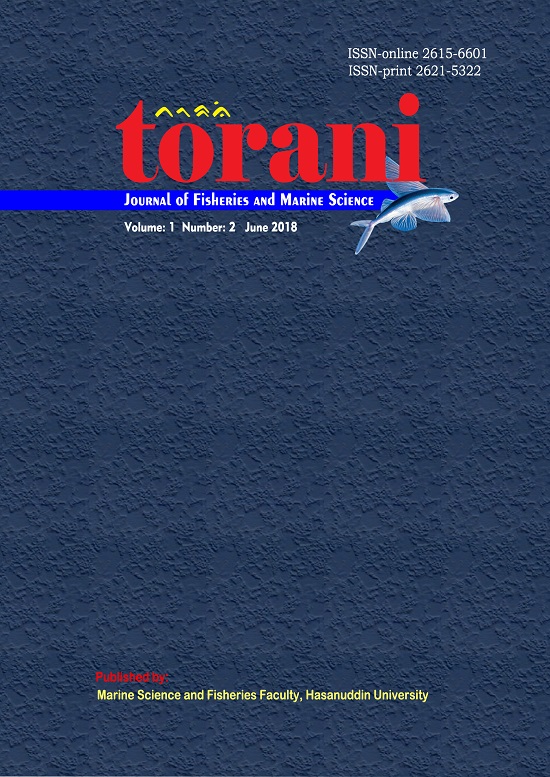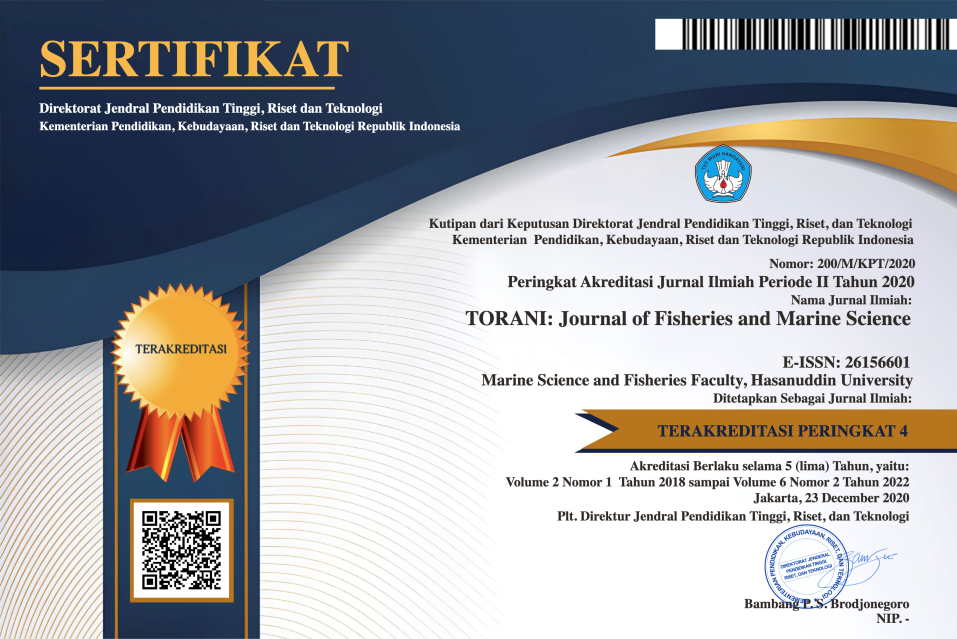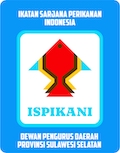Effectiveness of Addition Papain Enzyme in Artificial Diet on the Metamorphosis Rate and Glycogen Content of Mangrove Crab Larvae (Scylla olivacea)
DOI:
https://doi.org/10.35911/torani.v1i2.4440Abstract
In the rearing of fish larvae, artificial feed can be given when digestive enzymes have been produced. To improve the ability of fish larvae to utilize artificial feeds can be done with the addition of exogenous enzyme into the artificial feeds. The aim of this study was to determine the dose of papain enzyme and the correct predigest artificial feeding stadium on metamorphosis rate and glycogen content of mangrove larvae (Scylla olivacea). The experimental design used was a factorial pattern with a complete randomized baseline design, the first factor being the dose of papain enzyme (0%, 1.5%, 3.0% and 4.5%), while the second factor was the predigest artificial feeding stage (zoea 2 and 3). The results showed that the difference of dose of papain enzyme and predigest artificial feeding stages had significant effect (p <0.05) on the metamorphosis rate of 7, 9, 10, 12, 13, 16 and 17 day larvae, but the interaction between them was not significant (p>0,05). The rate of metamorphosis at doses of enzyme papain was 0% and 1.5% longer and significantly different (p <0.05) compared to 3% and 4.5% doses. The rate of metamorphosis at doses of 3.0% and 4.5% was not significantly different (p> 0.05). The content of glycogen larvae in dose of enzyme papain 4,5% not different than dose 1,5% and 3,0% but higher and significantly different than dose 0%. Glycogen content at dose 0%, 1,5% and 3,0%. was not significantly different (p> 0.05). Based on the results of these studies to hydrolyze feed proteins can be used papain enzyme with a dose of 4.5%.
Keywords: papain enzyme, metamorphosis rate, mangrove crab larvae (Scylla olivacea), glycogen content
References
AAmalia R, Subandiyono, Endang A. 2013. Pengaruh penggunaan papain terhadap tingkat pemanfaatan protein pakan dan pertumbuhan ikan lele dumbo (Clarias gariepinu). Journal of Aquaculture Management and Technology. 2 (1): 136 - 143
Gatesoupe F, Luquet P. 1991. Practical diet for mass culture of the rotifer Brachionus plicatilis: application to larval rearing of sea bass, Dicentrarchus labrax. Aquaculture. 22:149 - 163
Gawlicka A, Parent B, Horn MH, Ross N, Opstad I, Torrisen OJ. 2000. Activity of digestive enzymes in yolk-sac larvae of Atlantic halibut (Hippoglossus hippoglossus): indication of readness for first feeding.Aquaculture. 184:303 – 314.
Hamzah H. 2005. Efektivitas penambahan enzim papain pada pakan buatan terhadap kelangsungan hidup dan pertumbuhan larva ikan bawal bintang (Trochinotus blochii Lacepede 1801). Tesis Program Pascasarjana UNHAS, 53 Hal.
Handayani, H, W.Widodo. 2011. Nutrisi Ikan. UMM press Malang.
Haryati, Fujaya Y, Zainuddin, S. Aslamyah, Saade E. 2014. Perkembangan aktivitas enzim pencernaan kepiting bakau (Scylla sp.) dari stadia zoea ke megalopa dalam hubungannya dengan kemampuan memanfaatkan pakan buatan. Jurnal Aquaculture Indonesiana. Vol. 15 (1): 35 - 41
Haryati, Fujaya Y, Anugrah. 2015. Pengaruh pergantian pakan alami dengan pakan buatan terhadap aktivitas enzim pencernaan kepiting bakau (Scylla olivacea). Prosiding Seminar Nasional Perikanan dan Kelautan XII, jilid I Budidaya Perikanan, hal: 137 - 144.
Haryati, Fujaya Y, Saade E. 2017. Optimalisasi penggunaan pakan buatan dalam pembenihan larva kepiting bakau (Scylla olivacea) untuk menunjang penyediaan benih berkelanjutan. Laporan Penelitian UPT tahun I
Hasan ODS. 2000. Pengaruh penggunaan enzim papain dalam pakan buatan terhadap pemanfaatan protein dan pertumbuhan benih ikan gurame (Ospronemus Gouramy Lac.). Tesis Institut Petanian Bogor, 57 Hal.
Hutabarat GM, Rachmawati D, Pinandoyo. 2015. Performa pertumbuhan lobster air tawar (Cherax quadraicarinatus. Melalui penambahan enzim papain dalam pakan buatan. Journal of Aquaculture Management and Technology. 4(1): 10 – 18.
Lauff , M, Hofer R . 1984. Proteolitic enzymes in fish development and the importance of dietary enzymes. Aquaculture. 37: 335 - 346
Pavasovic M, Richardson NA, Anderson AJ, Mann D, Mather PB. 2004. Effect of pH, temperature and diet on the digestive enzyme profiles in the mud crab, Scylla serrata. Aquaculture. 242: 641 – 654
Putri, D.S. 215. Pengaruh penggantian pakan alami dengan pakan buatan terhadap kelangsungan hidup dan pertumbuhan larva ikan bawal bintang (Trachinotus blochii, Lacepede). Tesis Universitas Hasanuddin
Redzuari, A., M.N. Azra, A.B. Abol-Munafi, Z.A. Aizam, Y.S. Hii & M. Ikhwanuddin, 2012. Effects of feeding regimes on survival, development and growth of blue swimming crab, Portunus pelagicus (Linnaeus, 1758) larvae. World Applied Sci. Journal. 18: 472-478.
Sorgeloos P, Cotteu P, Dhert P, Merchie G, Lavens P. 1998. Use of brine shirmp, Artemia sp. In larval crustacean nutrition. Review in Fisheries Science. (182): 55 – 68
Suhartono MT. 2005. Protease. Pusat Antar Universitas, Bioteknologi IPB, 76 Hal.8.




















